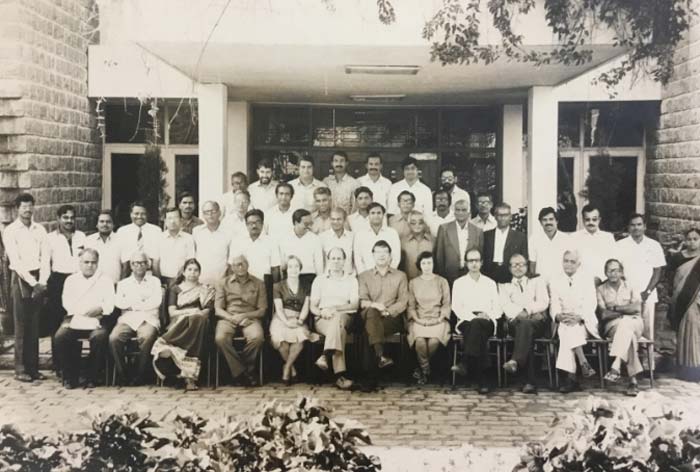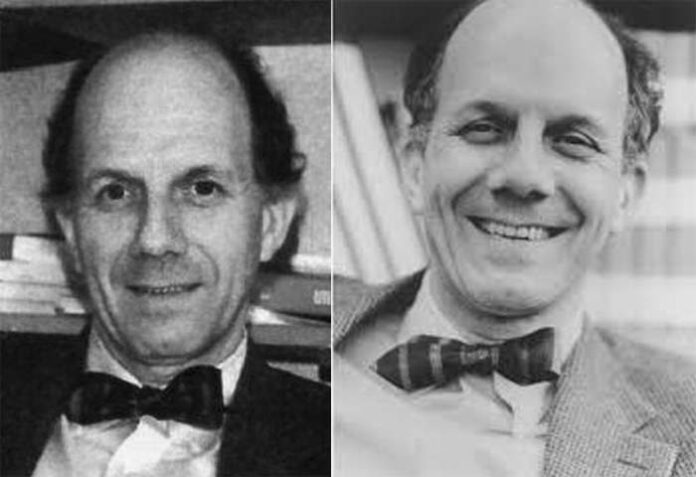Down the memory lane
Professor Myron Weiner (1931-1999) was an American political Scientist with an abiding interest in studying various aspects of Indian politics. Further his works on developing countries provide a comparative perspective. The themes of his studies are very varied and include internal and external migration, ethnic conflict, refugees, agrarian and industrial relations,etc. At the time of his death he was engaged in analysing immigration policies, refugee flows and child labour .He was a brilliant scholar and an academic.
He began his teaching career at Princeton, then moved to Chicago and in 1961 to MIT and in due course became Professor of Political Science, Chairman of the Department (1974-1977) and Ford International Professor of Political Science. He was also Director ,MIT Center for International Studies from 1987 till 1992. He was consultant on South Asia for US State department, National Security Council, Agency for International Development and the World Bank for several years .From 1996 he was Chair of the External Research and Advisory Committee of United Nation’s High Commissioner for Refugees till his death.
Lived in India for several years
During his career he held several visiting appointments at Harvard, Oxford, Hebrew University, Delhi University the University of Paris. He lived for several years in India and visited the country on shorter research trips almost every year thereafter. Originally specialising in Indian politics, he wrote 32 books – 13 on his own 19 in collaboration with others His works on India include the following:
(1)The Politics of Scarcity: Public Pressure and Political Response in India- This was his Ph.D.thessis for Princeton University in 1955 and was published in 1962
(2)Party Building in a New Nation: The Indian National Congress.
(3)State Politics in India.( published in 1968) this is a study in eight Indian States including Andhra Pradesh by different authors,Indian and foreign, edited by Weiner with his own introduction.The chapter on Andhra Pradesh was done by Hugh Gray. A few sentences about Gray by me may be seen towards the end.
(4)Party Politics-in India : The Development of a multi-party systems, 1972.
(5)Party building in a new nation, The Indian National Congress.
(6)India at the polls :The Parliamentary Election of 1977.1978
(7)India’s two Political cultures
(8)Electoral Politics in Indian States – 5 volumes
(9)The Indian Paradox::Essays on Indian Political
(10) Sons of the soil: Migration and ethnic conflict in India, – It was first published in 1978
(11)The Child and the State in India: Child Labour And Education Policy in comparative Perspective, Published in 1991. It was his last work on India
In this work Weiner observer as follows:
working children
India has the largest number of non-school going working children in the world. Why has the government not removed them from labour force and required them to attend the school as have the governments of all developed and many developing countries?
Also Read : TSK calls for legislation to regulate political parties
To answer this question, this major comparative study first looks at why and when other States in the world have intervened to protect children against parents and employers. By examining Europe in the 19th century, the United States, Japan and a number of developing countries, Weiner rejects the argument that children were removed from the labour force only when the incomes of the poor rose and employers needed a more skilled labour force.
His observations based on firsthand knowledge of the harsh ground reality show his deep concerns for the future and welfare of these children.The purpose of the study is not to condemn India but to protect and promote the welfare of India’s children whose future is at stake.
What happened after the publication of his work?
Right to Education
The eighty sixth amendment of the Constitution was passed in 2002 to include the Right to Education as a fundamental Right -Article 21A -.Seven years later the Right to Education Act was passed in 2009. The 86th Amendment Act came into effect on 1-4-2010 .i.e. 8 years after it was enacted. Yet the condition of child labour continues as it was probably more children might have come to the labour market
The Problem is a complex one. Laws are necessary but not enough to bring about the required changes. Primary education is listed as one of the functions of Panchayats. What is to be noted is the fact that India has been experiencing increasing urbanisation. Further, primary schools do exist in municipalities though primary education is not listed.
Article of faith
A vigorous drive by the elected members of Panchayats and Municipalities as well as by officials during their term, with appropriate steps like incentives to parents from State and Central governments regularly monitored by the respective authorities. It is also necessary to see that the standard of the three Rs of those passing out of primary schools Is good. This cannot be done in a year or five years It should be an article of faith for successive State and Central governments to continue the programmes. A point to be noted in this context is the fact that children of certain castes, tribes or religions may be very large in number. Reservations exist for BCs ,SCs and STs. The elected members have the primary ‘duty ‘ of Taking necessary steps for the future welfare of the children of their castes.
Also Read : Remembering JP Naik, an educator par excellence
My books were described excellent
Professor Myron Weiner and I met for the first time in New Delhi in 1969. By then I had been studying the ongoing Telangana agitation for a Telangana State. Possibly he had become aware that I had been working on Telangana Regional Committee. In his work on ‘Sons of the Soil’ published in 1978 the fifth chapter- Middle – class Protectionism ;Mulkis Against Migrants in Hyderabad, concerns with this agitation. He indicates that the data for the study rests on four specified resources( Incidentally, he refers to my books as’ two excellent books on the politics of Andhra) It would be a worthwhile chapter to read and ponder over now, Other chapters include some other States wherein problems arising about internal migration in India have caused agitations.
A frequent visitor to India
We had been in touch with each other after I left Delhi .During my stay in Hyderabad as Deputy Director, at NIRD (1973-85), he used to meet me in Hyderabad during his visit to India. At his instance ,I prepared a monograph in 1977 on Mulki Rules for the Working Group on Internal Migration on Development at the MIT ((Cambridge).The members of that Group were :Jagdish Bhagwati, Nagil Chouce, Wayne N Conelius and Myron Weiner. The monograph is available online. Later in 1981, I was coauthor of a book on Preferential Policies in India with Weiner, brought out by Chicago University Press. There was a group photo with Prof Weiner at the American Studies Research Center, Hyderabad . I am unable to recollect the year and the occasion and the names of those in the photo. Those present were Faculty and Staff of the Centre and Indian scholars working on American themes. I was a special invitee. I will be happy, if someone who reads this recognises at least some of them and informs me or the Prime Post. I was an invitee for that function and may be seen in the photo( sitting row, first from the right)

Hugh Gray, Labour Party leader
Hugh Gray: A reference was made to Hugh Gray who wrote the chapter on Andhra Pradesh , in State Policics in India.
Hugh Gray ( 1916- 2002) was a Labour Party Member of House of Commons in the UK from 1966 to 1969. Later he was with the School of Oriental and African Studies (SOAS), University of London. He published articles on Telangana agitations in 1968. It is said that he was refused admission to Sri Venkateswara Temple in Tirumala as he was not a Hindu and that to overcome the issue, PV NarasimhaRao, then a Minister in Andhra Pradesh, was instrumental in the Tirumala-Thirupati Devasthanam allowing a non-Hindus if they sign a declaration.
Review in The Times Literary Supplement
Prbably he was aware of my works on Andhra Pradesh through a review in the well known The Times Literary Supplement, London, in July 1973 . An excerpt from the review is given below:
Dr K V Narayana Rao, who has already written an excellent account of how the State (of Andhra Pradesh ) came into existence, has performed a real service in examining, with a wealth of details underlying causes of the (Telangana ) Agitation, the difficulties attendant upon their removal and the failure to apply appropriate remedies in good time.This study is of more than local interest. It is in many respects a case – example of the development of regional loyalties of the kind that a quite a number of Indian States are hard put to contain in the interest of their own territorial integrity. The parallels which Dr Rao draws with Scottish nationalism and with other similar movements in the West are very suggestive.
Also Read : Understanding Music
A lecture at Tirupati
Gray arranged for a lecture by me at the SOAS when I was in UK as a visiting fellow with Institute of Local Government Studies in Birmingham University under Columbo Plan in 1980. He had in 1954 married Edith Rudinger (1925- 1998). As General Secretary of the Theosophical Society in England, he organised in 1986 the First International Conference on Theosophical History in London. Later, he became Internaional Secretary of Theosophical Society and moved to Adyar in Chennai, the head quarter of the Theosophical Society. During his stay in Chennai at my invitation ,he, with his Wife came to Tirupati and gave a lecture at the Senate Hall in Sri Venkateswara university.




